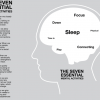So what does chocolate and neurotransmitters have in common? Chocolate affects the brain by causing the release of certain neurotransmitters which can trigger emotions, one of which is euphoria; maybe that's why it is so desirable?
Cacao is derived from Theobroma Cacao beans, which literally means "Food of the Gods". Cacao contains over 300 compounds including: protein, fat, carbohydrates, fiber, iron, zinc, copper, calcium and magnesium. Magnesium helps to build strong bones and is a muscle relaxant associated with feelings of calmness. Cacao is also high in sulfur, which helps form strong nails and hair.
In addition, cacao also contains the chemicals phenylethylamine (PEA) and anandamide. PEA is an adrenal-related chemical that we create naturally when we're excited. It also plays a role in feeling focused and alert because it causes your pulse rate to quicken, resulting in a similar feeling to when we are excited or fall in love!
Another 'bliss' chemical found in chocolate is the lipid anandamide. It's there in our brain when we feel great. Anandamide is also called "chocolate amphetamine" as it causes changes in blood pressure and blood-sugar levels, leading to feelings of excitement and alertness.
Learn more: http://www.naturalne...l#ixzz46WDRtWj7
Chocolate gets right to the heart of sexual pleasure by increasing the brain’s level of serotonin, the feel-good brain chemical. Serotonin plays a major role in positive mood, emotional health, proper sleep and balanced appetite, contributing to numerous behavioral and physiological functions. Decreased serotonin is a well known factor in cases of depression. Increased brain serotonin promoted by chocolate increases sexual excitation, desire and responsiveness. Women have more serotonin in their systems than men and appear to be more sensitive to chocolate. Chocolate provides a mood boost to women during PMS and menstruation, when serotonin levels are often down. It also puts women in the mood for love. Men and women with depleted serotonin levels demonstrate increased aggressive sexual tendencies, a higher rate of masturbation, and increased promiscuity. Violence, aggressive behaviors, and higher rates of suicide have all been associated with reduced brain levels of serotonin. Many people consume chocolate as a form of self medication, whether they are aware of the fact or not. Chocolate’s serotonin elevating activity helps to modify mood in positive ways and acts as a sexual sweetener. These serotonin-related effects enhance the sense of closeness between lovers.
Probably the most influential love compound in chocolate is PEA, phenethylamine. This chemical, which occurs in chocolate in small quantities, stimulates the nervous system and triggers the release of pleasurable opium-like compounds known as endorphins. PEA also potentiates the activity of dopamine, a neurochemical directly associated with sexual arousal and pleasure. PEA acts as a potent antidepressant in both sexes and rises during periods of romance. The giddy, restless feelings that occur when we are in love are due to a great extent to PEA, which significantly increases in the brain at that time, and when we achieve orgasm. Some scientists dismiss this notion, claiming that the PEA in chocolate is metabolized too quickly to produce a significant mood-altering effect, but others disagree. Why else would chocolate be so inextricably intertwined with love and romance? While there are a great many agents in nature which boost libido and enhance sexual function, chocolate alone actually promotes the brain chemistry of being in love.
















































